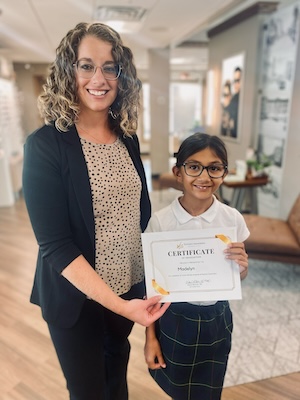Spring 2024 Newsletter
Vision Therapy and Rehabilitation News
Meet Candice
Candice Callaway is a vital part of the team at Eyecare Associates. In addition to managing insurance and billing, she is also one of our vision therapy coordinators. Candice has worked at Eyecare Associates for five years after previous experience with in the medical field.
Candice lives in the BCLUW Community school district with her husband, Blake, and their two children, Emily and Aydien. In her free time, Candice enjoys being crafty and spending time with her family.
Symptoms of Focusing Problems
- Blurred Vision
- Headaches
- Fatigue
- Eye strain
- Poor posture with near work
- Difficulty shifting focus from one distance to another
- Moving print
- Inconsistent work
- Avoids reading
- Poor attention
If these symptoms apply to you, or someone you know, schedule an appointment today!
Focusing and Vision
Our eyes have an automatic focusing system which adjusts the lens inside our eye in order to see clearly at all distances. When we look far away, up close, and back again, our eyes change focus rapidly to allow us to see things clearly at all distances. If there is a problem in how easily or quickly our eyes focus, that visual problem is called an accommodative dysfunction.
Normally, children have a large amount of focusing capacity. However, some children do not have the ability to maintain focus for a long time while reading, or they may be unable to quickly change the focus of their eyes from near to distance to near, etc.
In some cases, glasses for near use only, or in special bifocal form, may be needed. Improved focusing ability can usually be developed with a program of Vision Therapy.
Adults can also have Accommodative Dysfunction. However, this is not to be confused with a very common visual condition called presbyopia. Presbyopia is the term for age-related focusing problems. In adults, age-related focusing problems are due to loss of the natural elasticity of the lens inside the eyes. As we age, the focusing lenses become less flexible, and we begin to experience blurred vision at close distances.
See the box to the left for common symptoms of accommodative dysfunction.
*This article was taken from the College of Optometrists in Vision Development. The original article and references can be found at covd.org
Way to go Madelyn!
 According to Madelyn’s mother, “When Madelyn had her yearly eye exam we mentioned that she was having frequent headaches. Dr. Edwards completed her exam and mentioned the need to do more tests, but was thinking Madelyn needed vision therapy.”
According to Madelyn’s mother, “When Madelyn had her yearly eye exam we mentioned that she was having frequent headaches. Dr. Edwards completed her exam and mentioned the need to do more tests, but was thinking Madelyn needed vision therapy.”
When Dr. Monroe saw Madelyn, she found that Madelyn had reduced convergence ability – which is the skill necessary for her eyes to point in the same place while reading.
Because Madelyn’s convergence ability was so poor, she was having double vision, blurry vision, and headaches with reading. Her mother says, “After vision therapy, she has greatly reduced the headaches she gets. Madelyn shares that she does not see double when she reads and has made great progress.”
Madelyn’s convergence and focusing abilities of her eyes are now functioning within the normal range for her age. Homework that used to take Madelyn 40 minutes to complete is now done in 20 minutes. Way to go Madelyn! We are proud of your hard work and success.
If you or someone you know isn’t performing up to their potential, take the symptom quiz by or schedule an appointment. Vision might be the key to unlocking their full potential!
Visit bit.ly/symptomquiz to take the symptom quiz.

